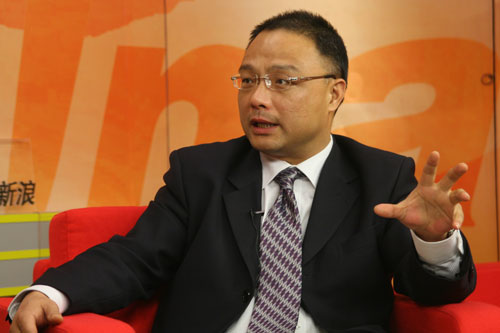
Recently, the ninth session of the 2009 SCIO Internet News Work Training Session just finished in Beijing. All participants are top editors and managers of major news websites in China. The trainers include:
* Li Wufeng, Bureau Chief of the State Council Information Office Internet Affairs Bureau
* Peng Bo, Deputy Chief of the State Council Information Office Internet Affairs Bureau
* Professor Zhu Feng, Peking University School of International Relations
* Song Fufan, Director of the Ideology and Political Education Teaching and Research Section of the Marxist Theory Research Department at the Central Party School of the Communist Party of China
* Zhai Huisheng, Party Secretary of the All China Federation of Working Journalists
* Professor Gao Gang, Secretary of the Party Committee of Renmin University School of Journalism and Communication
* Xia Chenghua, Deputy Chief of the Central Government Stability Preservation Leading Group Office
* Zhou Xisheng, Deputy Chief of Xinhua News Agency, Director-General of Xinhua News Agency
Soon after the training finished, one of the participants released her notes from this session online. CDT has translated the entire collection of notes from this 2009 SCIO Internet News Work training session; in total there are eight articles, which we will publish consecutively in coming days. CDT would like to thank the translator, who wishes to remain anonymous. Read notes from the first and second sections of the training. This is the third installment:
The Current International Situation and Our Country’s Foreign Policy
Professor Zhu Feng, Peking University School of International Relations
A. The media’s reporting of Obama’s visit to China was very unprofessional
i. China-U.S. relations are very complicated; one should not mechanically apply the word “harmonious.”
ii. China and the U.S. have not declared that they will establish a “relationship as partners.”
iii. Not only did the online media simply say good words and select nice sounding articles to reprint, it even republished an article from a small Spanish newspaper.
iv. There was no in-depth background analysis; there was only surface level policy explanation.
v. It was announced that Premier Wen does not approve of the phrase “Group of Two”*. However, the U.S. has never used the “Group of Two” concept.
vi. There were no prominent articles about important views raised by Obama.
B. The actual power gap between China and the U.S. is still quite large. This can be seen by the following:
i. National strength in many areas. [The U.S.] is strong and in the lead in more than one area.
ii. Ability to resolve problems, for example the Somali pirates that captured Chinese sailors.
iii. Ability to mobilize the international community, having countries within their sphere of political influence.
iv. The power of a great nation to influence with words, ability to create solutions to resolve issues.
C. The media creates the viewpoint with which Chinese people see the world. The greatest security challenge facing China comes from within. The increase in China’s power actually comes from systemic transformations. Online news media must pay close attention to China’s domestic problems. The advantage of America compared to China is that it has mature institutions that have gradually developed through a lengthy process. Therefore, China compared to America is an “unrefined” great nation.
D. The success of Obama’s visit to China does not lie in smiling photo-ops, but in the following areas:
i. China and the U.S. are both continually pushing forward mechanisms to oversee relations between the two countries.
ii. China and the U.S. created new measures with which to solve problems.
iii. China and the U.S. displayed new enthusiasm and vision.
E. Problems that China must avoid on its road to development
i. Avoid becoming like Japan
During World War II, Japan impulsively attacked Pearl Harbor, anxious to fight a decisive battle. The result was that it became an occupied territory.
ii. Avoid becoming like Latin America
When Latin American countries began developing, they did whatever the U.S. told them to do. They lacked a concept of self-sovereignty. This caused their domestic economies to be hollow; their economic prosperity was unable to be lasting.
F. Conclusion: the real “world superpower” emerges through waiting. As long as you make few mistakes, others will “give you” a chance.* “Group of two”, or G-2 (Chinese: liang guo ji tuan), is a concept introduced by former U.S. National Security Advisor Zbigniew Brzezinski’s. It implies a U.S.-China convergence of interests, and a relationship whereby the two countries regulate the world economy.
《当前国际形势与我对外政策》
北京大学国际关系学院教授朱锋
一、媒体对此次奥巴马访华的报道很不专业:
1、中美关系很复杂,根本不能套用“和谐”这个词。
2、中美并未宣布建立“伙伴关系”。
3、没只说好话,只挑好听的转载,甚至一家西班牙的小报都转载。
4、没有深入的背景分析,只有表面的政策解读。
5、宣扬温总理说不赞成两国集团,但是美国从来没有提过“两国集团”这种概念。
6、对奥巴马提出的重要观点并没有突出报道。
二、中美的真实实力差距仍然很大,主要体现在以下几个方面:
1、综合国力。不光是一方面的强大和领先。
2、解决问题的能力,比如对绑架中国船员的索马里海盗。
3、国际的动员能力,有多少国家围着你转。
4、大国话语的影响力,解决方案的制造能力。
三、媒体在给中国人创造看待世界的观念。中国所面临的最大安全挑战是来自内部,中国实力的提高其实是来自体制的转型,网络媒体要关注中国的国内问题。美 国与中国相比,优势是有一个成熟的机制,这是其长期发展的过程中渐渐形成的。所以,与美国相比,中国只是一个“粗糙”的大国。
四、奥巴马访华的成功之处,不在于双方的笑脸相迎,而是以下几个方面:
1、中美双方正在不断地推进对彼此关系的管理体制。
2、中美双方创立了新的解决问题的办法。
3、中美双方展示了新的热情和眼光。
五、中国发展道路上必须避免的问题:
1、避免日本化。
日本二战时一时冲动攻击美国珍珠港,急于与人决斗,于是沦为被占领地。
2、避免拉美化。
拉美国家开始发展的时候什么都听美国的,没有自主意识,造成民族经济的空洞化,经济繁荣不能持久。
六、总结:真正的世界“老大”是等出来的,只要你少犯错误,别人就会“给你”机会。
[To be continued]







